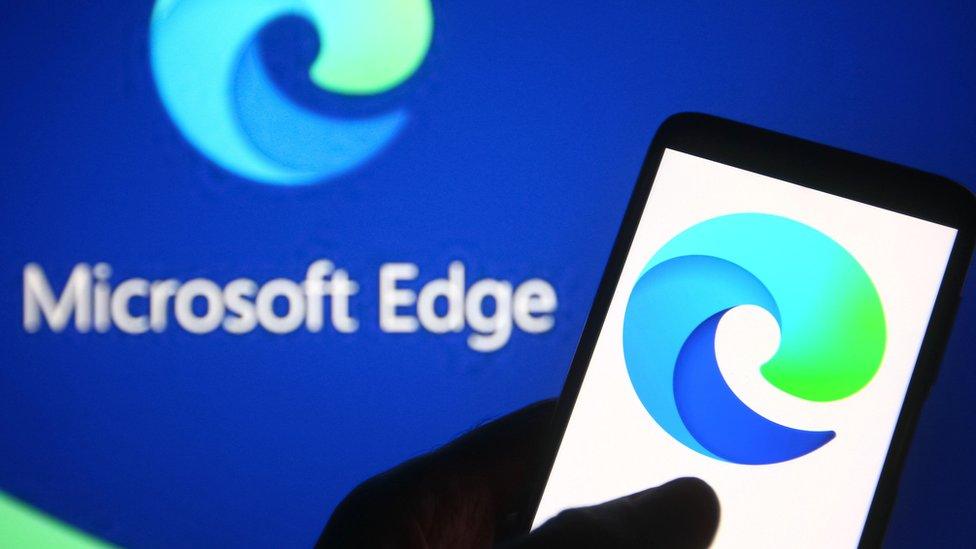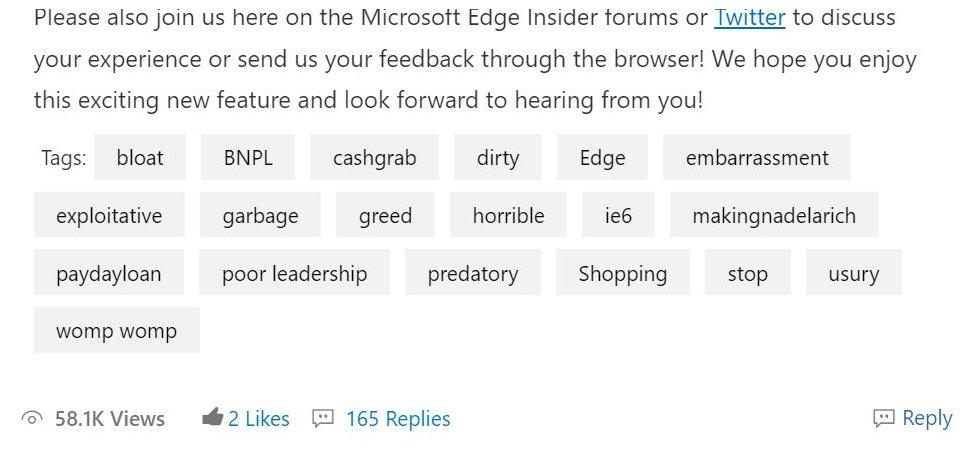Microsoft Edge buy now pay later scheme met with criticism
- Published

Microsoft is under fire from angry users after announcing plans for a built-in "buy now pay later" function in its Edge web browser.
Such schemes let buyers divide payments into smaller chunks over time - but have been criticised for their risk of users getting into debt.
Microsoft has added one provider to the checkout page of shopping sites as a default payment option.
But users have accused Microsoft of greed and a "cashgrab" mentality.
Thanks to a user-based tagging system, those accusations have been turned into tags on the official announcement.
As a result, Microsoft's blog post, external now features tags such as "poor leadership", "exploitative", "garbage" and an "embarrassment".
'Shameless cashgrab'
Microsoft says it "does not collect a fee for connecting users to loan providers" and it is not clear what benefit the company is receiving from the deal struck with payment provider Zip.
Users, however, accused Microsoft of trying to make money.
"Please stop bloating the browser with these revenue grabs," one commenter wrote. "It's like you're recapitulating the worst [Internet Explorer] browser extensions from the 90s/00s and installing them by default."

Examples of the tags appearing on Microsoft's post about the new feature
Another wrote: "This is a terrible bloatware baked directly into the browser."
"It's not like Microsoft needs the money to fund the browser development," said a third user.
And the top-rated reply calls it an "awful idea that will only be seen as a shameless cashgrab" by the media. "The negative press this feature is going to receive isn't worth it," it said.
Allow X content?
This article contains content provided by X. We ask for your permission before anything is loaded, as they may be using cookies and other technologies. You may want to read X’s cookie policy, external and privacy policy, external before accepting. To view this content choose ‘accept and continue’.
The new feature inserts the payment option "at browser level", Microsoft says - so that it appears as a payment method next to the credit card field at checkout.
It integrates with Zip's payment system to let any purchase between $35 and $1,000 (£26-£750) be split into four payments over six weeks, subject to approval.
It is planned to be released to "all users" in a future update.
Microsoft said the new feature is marketed as allowing "shoppers to get their purchase up front, instead of having to wait until it's paid in full".
Because the option is baked into the browser, it is put on websites without permission from the site owner. The only way to opt out is to contact Microsoft and ask.
Missed payments
While buy now pay later features are very popular among shoppers, the industry is not without controversy.
In the UK, Citizens Advice has warned users not to spend more than they can truly afford, and to make sure they understand what they're signing up for. The Treasury and the Financial Conduct Authority are considering additional regulation, external of the industry.
In the US, a study by personal finance company Credit Karma suggests, external that more than a third (34%) of people using such plans had fallen behind on payments, and 72% of those who had missed one payment believe it had hit their credit score.
Against that backdrop, Microsoft's introduction of the feature as a heavily-advertised payment option in a mainstream web browser has rubbed many up the wrong way.
The browser comes pre-installed with Windows, and the set-up process for the latest version - Windows 11 - heavily encourages users to stick with Edge over competitors such as Chrome or Firefox.
Despite that, Microsoft has failed to recapture the significant proportion of the web browser market it once held at the turn of the millennium. Modern estimates suggest that it has less than 10% of the desktop web browser market, losing out to Chrome and Safari.
Microsoft and Zip have been approached for comment.
Related topics
- Published29 November 2021

- Published3 September 2021

- Published18 October 2021
